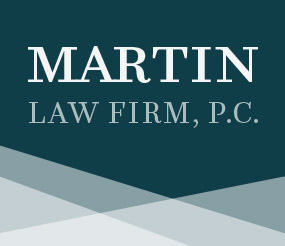Estate Administration Lawyers in Delaware County
Resources
Practice Areas
Schedule a Case Evaluation Today
Properly administering and closing an estate of a loved one can be challenging and overwhelming. The Martin Law Firm, P.C. provides exceptional service for probate and estate administration matters, helping to take the burden off of the executor or administrator of an estate. Located in Blue Bell, PA, the Martin Law Firm routinely handles matters in the Register of Wills and the Orphans’ Court for Pennsylvania.
After a friend or family member passes away, the deceased person’s assets must pass to the heirs. There are three (3) ways that assets can pass to the surviving heirs:
- Operation of Law. This is when a deceased person owns an asset with another person as joint tenants with a right of survivorship (this is often referred to as “JTROS”). For married couples, the JTROS is called Tenants by the Entireties. Whether it is JTROS or Tenants by the Entireties, the surviving joint tenant will automatically take ownership of the jointly owned property when the other owner dies. For example, if John and Mary are married and they own their house as Tenants by the Entireties, when John dies, Mary automatically owns 100% of the house.
- Beneficiary Designations. Some assets allow the owner to name beneficiaries who will receive the asset upon the death of the owner. Common assets with beneficiary designations are life insurance, IRAs, 401(k)’s, and other retirement accounts. If John has life insurance and Mary is named the primary beneficiary, then Mary will receive the death benefit of the life insurance directly from the life insurance company who issued the policy.
- Probate Assets. If the asset does not pass by operation of law or through a beneficiary designation, then the asset must pass through the estate of the deceased individual. The estate must be “opened” at the Register of Wills office in the county where the decedent resided at the time of his/her death. If an individual has a valid Will at the time of death, the executor named in the Will must open the estate. If the individual did not have a Will, then a close family member who meets certain requirements must open the estate. This person is called the administrator. The Will determines who is to receive the estate assets (the beneficiaries). When there is no Will, the Pennsylvania intestacy law will determine who receives the assets.
Personal Representative
The executor or the administrator is commonly referred to as the Personal Representative. Before the Personal Representative can act on behalf of the estate, the person must be formally appointed by the Register of Wills. The Register of Wills will issue Letters Testamentary to the named executor in the Will or Letters of Administration to the administrator when there is no Will.
Personal Representative Duties
The Personal Representative (executor or administrator) have the same responsibilities and duties and they must perform certain tasks required by Pennsylvania law. The usual tasks are:
- Locating the assets of the deceased individual
- Protecting the assets
- Identifying debts or liabilities of the deceased individual and settling any estate claims
- Notifying the heirs and third party creditors or other interested parties
- Opening an estate bank account
- Selling real estate and other assets
- Preparing and filing an estate inventory
- Preparing a formal or informal accounting
- Distributing the assets to heirs
- Implementing tax savings strategies
Responsibilities of the Personal Representative
Personal Representatives are fiduciaries. A fiduciary possesses certain legal obligations to the beneficiaries of the estate. A fiduciary has the highest duty of care and loyalty that the law provides. If a Personal Representative violates the duty of care or loyalty, then the Personal Representative can be held personally responsible to those who may be affected, usually the beneficiaries of the estate. For example, if the Personal Representative retains assets that are invested in high-risk securities and the value declines, the Personal Representative could be exposed to personal liability for failure to act responsibly.
Locating Assets
The Personal Representative must locate all of the assets of the decedent. Common assets include savings and checking accounts, real estate, life insurance, personal belongings, investment accounts, retirement accounts, automobiles, CDs, and the like. Finding assets sometimes requires a diligent search of the decedent’s home, safe deposit box, office, mail, and computer files. Another way to locate assets is to review prior income tax returns of the decedent and speaking to the decedent’s accountant, investment advisor and lawyer.

Protecting Assets
Preserving and protecting the assets ensures that the beneficiaries receive the assets. The Personal Representative must consider whether to sell high risk investments such as stocks, make sure that the decedent’s car and home are locked and insured, and place jewelry and valuables in a safe place.
Debts And Liabilities
The Personal Representative must make sure that the estate satisfies any outstanding debts and liabilities of the decedent. This may include a mortgage, car loan, unpaid taxes, credit cards, and medical bills. Pennsylvania law requires publishing notice of the estate in newspapers to give creditors an opportunity to file a claim against the estate. Creditors have one (1) year to file a claim against the estate identifying the nature of the debt and the amount owed. All creditor claims must be paid and satisfied before final distribution of the estate assets to the beneficiaries.
Notice To Beneficiaries And Other Interested Parties
The Personal Representative must send notice to beneficiaries named in the Will, certain family members, creditors and other interested parties. Notice should also be given to the IRS, charities named in the Will, agents who may be acting through a power of attorney, the Pennsylvania Department Human Services, parties to litigation, etc. The Personal Representative must also file a certification with the appropriate Pennsylvania county Register of Wills office stating that the Personal Representative of the estate has properly complied with the notice requirements for beneficiaries.
Estate Bank Account
Personal Representatives should open up an estate checking account. To do this, the Personal Representative must apply for and receive an EIN (TAX ID) from the IRS. The Personal Representative should then close the bank accounts in the name of the decedent and transfer those funds into the estate account. The Personal Representative should compare services and other charges at several banks. Other funds from the estate can be deposited into the estate account, such as net proceeds from the sale of real estate. When estate expenses or creditor claims need paid, the Personal Representative can write checks from the estate account. A complete and accurate ledger of all deposits and credits should be kept.

Selling Real Estate And Other Assets
Personal Representatives should decide which assets should be sold and which assets should be transferred “in kind” to the beneficiaries. If an asset is sold, the Personal Representative should keep track of all expenses incurred to make the sale happen such as advertisements, closing costs, and other fees. Before any asset is sold, the Personal Representative should determine the fair market value of the asset to make sure that the Personal Representative advertises an adequate sale price. Determining fair market value can be achieved with the help of an appraiser, if necessary.
Estate Inventory
A Personal Representative is required by Pennsylvania law to file an Inventory of the estate. An Inventory is a comprehensive list of all estate assets. The value of the estate assets should also be included in the inventory. The Estate Inventory can be used to help complete the PA Inheritance Tax Return and should be filed at the county Register of Wills office along with the PA Inheritance Tax Return.
Taxes
The Personal Representative must file and pay taxes. Taxes may include the final federal and state income taxes for the decedent, unpaid local taxes, transfer taxes, inheritance taxes and the Federal estate taxes. Income tax returns should be prepared by an accountant. Federal estate tax returns may or may not be necessary, depending on the value of the decedent’s estate.
The Pennsylvania Inheritance Tax applies to a decedent’s estate regardless of the size of the estate. The tax rate is based on the decedent’s relationship to the beneficiary. If the assets pass to a surviving spouse, the tax rate is 0%; transfers of assets from parents to children and other lineal descendants are taxed at a rate of 4.5%; the rate for transfers between siblings is 12%; and the rate for transfers to nieces, nephews and other beneficiaries is 15%. Upon the death of a child age 21 or younger, there is no tax on assets that pass to that child’s parent or step-parent. A probate and estate administration attorney should assist the Personal Representative with the preparation of the inheritance tax return (REV-1500). The REV-1500 must be filed within nine (9) months of the date of death unless an extension is granted. Late returns are subject to penalties and interest. Any extension granted by the PA Department of Revenue will avoid penalties, but interest continues to accrue. If an estimated tax payment is made within three (3) months of the date of death, a discount of 5% will apply. The Personal Representative should carefully consider how the PA Inheritance Tax applies to jointly owned property, life insurance, and retirement plans.

Asset Distribution And Closing The Estate
The easiest way to distribute the estate assets is through an informal process. This is done with a family settlement agreement which is an agreement between the Personal Representative and all of the beneficiaries. The agreement will include an informal accounting that shows all of the income, assets, debts, liabilities and expenses of the estate. The bottom line number is the net estate that is subject to distribution. When all of the beneficiaries review and approve the informal accounting and the proposed distribution, the Personal Representative can distribute the assets and then notify the Register of Wills that the estate can be closed. A family settlement agreement binds all of the parties who sign it. It is important to consider that although a family settlement agreement is a legally binding contract, it does not necessarily prevent parties from pursuing additional claims against an estate. The family settlement agreement should provide for the recovery, on a pro rata basis, of distributions paid to the beneficiaries if they are needed to satisfy a future claim from a creditor.
A more complicated and time consuming way to distribute the estate assets is to file a formal accounting with the Orphans’ Court along with a statement of proposed distribution. The Personal Representative must file a legal breakdown of the estate assets and expenses. The accounting is accompanied by a request for an audit date. If any objections to the accounting are properly filed, the Orphans’ Court Judge will set a date to hear the objections. If there are no objections, then the Personal Representative is given permission to file a Petition for Adjudication. The Petition for Adjudication requests the right to make all distributions and to pay all of the remaining bills. Once the judge approves the Petition for Adjudication, distributions and payments can be made and then the estate can be closed.
Private And Estate Administration Lawyers
The Martin Law Firm probate and estate administration lawyers will provide compassionate, comprehensive guidance throughout the entire process, ensuring that your responsibilities as Personal Representative are met and that you remain protected from personal liability. Our probate lawyers represent Personal Representatives for estates in Pennsylvania as well as the surrounding counties of Bucks, Philadelphia, Delaware, and Chester County. Contact The Martin Law Firm today at (215) 646-3980 to speak with an experienced probate and estate administration lawyer today.
Please call (215) 646-3980 to schedule an appointment.
Practice Areas
Our legal team provides individualized legal solutions for our clients by offering high quality legal counsel and representation in diverse areas of law. Our attorneys regularly represent clients throughout Southeast Pennsylvania, including Montgomery County, Bucks County, Chester County, Delaware County, and Philadelphia County.
Tell Us About Your Case
Please submit the form and an attorney will contact you shortly.
Please indicate how you would like to be contacted in the form.
